The Iliad (Penguin Classics) Read online
Page 23
(10) ’If I find any god taking independent action and going to help the Trojans or Greeks, he shall be thrashed and indecently packed off back to Olympus. Or I will seize him and hurl him into the gloom of Tartarus, far, far away, where the deepest of all chasms yawns below the world, where the Iron Gates are, and the Bronze Threshold, as far below Hades as the earth is under the skies. That will teach you how far I am the most powerful of all the immortals.
‘Come on, you gods, try me, if you like, and find out for (20) yourselves. Tie a golden rope to Olympus and take the other end of it, all of you, gods and goddesses together. Try as hard as you like, you will never drag Zeus the high counsellor down from the skies to the ground. But if I cared to pull in earnest from my end, I could haul the lot of you up here, and the earth and sea as well. Then I would make the rope fast to a spur of Olympus and leave everything to dangle in mid-air. That is how much stronger I am than gods and men.’
So he spoke and was received in complete silence by them all. The bluntness of his words had taken them completely by (30) surprise. Eventually the goddess grey-eyed Athene spoke:
‘Father of ours, son of Cronus, lord supreme, we all know well enough you are invincible. But we are sorry for the Greek spearmen, who will be left to their wretched fate – destruction. However, we will refrain from fighting, as you command, and shall concentrate instead on offering helpful advice to the Greeks, so that they will not all come to grief because of your anger.’
Zeus who marshals the clouds smiled and said:
‘Have no fear, Triton-born Athene, dear child. I was not in (40) earnest and do not mean to be unkind to you.’
With these words Zeus harnessed to his chariot his two swift horses with their hooves of bronze and flowing manes of gold. He dressed himself in gold, picked up his splendid golden whip, mounted his chariot and lashed the horses with the whip to get them moving. The willing pair flew off midway between the earth and starry sky and brought him to Gargarus, a peak of Mount Ida of the many springs, the mother of wild beasts, where he has a precinct and smoking altar. There the Father of (50) men and gods pulled up his horses, freed them from the yoke and wrapped them in a dense mist. Then he sat down on the heights, exulting in his glory and looking out over the Trojans’ town and Greek ships.
Meanwhile the long-haired Greeks snatched a meal in their huts and then armed; while on the other side, in the town, the Trojans also prepared themselves for battle. There were fewer of them, yet they were still determined to confront the enemy face-to-face, driven as they were by the need to fight for their wives and children. The gates were all thrown open, and with a great din their whole army, foot-soldiers and charioteers, (60) poured out. The armies advanced and met in a single space with a great clash of shields, spears and bronze-armoured warriors. The bossed shields collided and a great roar went up – the screams of the dying, the jeers of the victors – and the earth ran with blood.
The Greeks retreat
Right through the morning, while the blessed light of day grew stronger, volley and counter-volley found their mark and men kept falling. But when the sun was high in the sky, the Father held out his golden scales, (70) and putting death that lays men low in either pan, on one side for the horse-taming Trojans, on the other for the bronze-armoured Greeks, raised the balance by the middle of the beam. The beam came down on the Greeks’ side, spelling doom for them. Their destiny settled on the bountiful earth, while that of the Trojans went soaring up to the broad sky. Zeus thundered out from Mount Ida and launched a flash of vivid lightning at the Greek troops, who were confounded by it. Terror drained the colour from every man.
Then, neither Idomeneus nor Agamemnon could bring themselves to hold their ground. Nor could the two Ajaxes, (80) attendants of Ares. Gerenian Nestor, guardian of the Greeks, was the only one to delay, not because he wanted to but because his third horse, the trace-horse, was in trouble. Godlike Paris, husband of lovely-haired Helen, had hit it with an arrow on the top of the crown where the mane starts to grow on a horse’s head, a deadly spot. In its agony it reared up, since the point sank into its brain; and writhing round with the arrow in it, the trace-horse threw the other horses into confusion.
Diomedes saves Nestor (5.313)
Nestor rushed in with his sword and was slashing at this horse’s reins when Hector’s horses came galloping up through the mayhem, with their daring charioteer, Hector himself, behind them. The old (90) man would then and there have lost his life but for the quick eye of Diomedes, master of the battle-cry, who saw the danger and shouted loudly to Odysseus for help:
‘Olympian-born son of Laertes, resourceful Odysseus, where are you off to, melting like a coward into the crowd, your shield slung behind you? If you don’t watch out, someone’ll hit you in the midriff with a spear as you run for it. But stop and help me keep this brute off old Nestor.’
So he spoke, but all-daring, godlike Odysseus did not hear him properly and sped by on his way to the Greeks’ hollow ships. Now on his own, Diomedes none the less engaged with (100) the front ranks, made a stand in front of Nestor’s chariot and spoke winged words:
‘Venerable sir, these young warriors are proving too much for you. You’re exhausted, with all those years to carry too. That attendant of yours is useless and your horses too slow. Come, get into this chariot and you’ll see what horses bred by Tros are like and how quickly they can cover the ground in pursuit or retreat. I took them from Aeneas only the other day, these masters of the rout. Let our attendants take charge of your (110) horses, while you and I drive this pair at the Trojans. Hector will soon know if I too have in my hand a spear raging for blood.’
Diomedes kills Eniopeus
So he spoke, and Nestor the Gerenian charioteer complied. So their two powerful attendants, Sthenelus and genial Eurymedon, took charge of Nestor’s mares while Nestor and Diomedes both mounted Diomedes’ chariot. Nestor took up the gleaming reins and started the horses with the whip. They were soon within range of Hector, and Diomedes let fly at him as he came charging up. He missed, but instead got Hector’s attendant and charioteer (120) Eniopeus. He hit him by the nipple on his chest, with the horses’ reins in his hands. He crashed out of the chariot and his horses shied. Life and spirit left him there.
His charioteer’s death wrung Hector’s heart but, sorry as he was for his comrade-in-arms, he left him lying there and went off in search of another daring charioteer. His fast horses were not long without a driver. He soon found daring Archeptolemus, made him get up behind the speedy pair and handed him the reins.
(130) (ZEUS’ hunderbolt warns Nestor) Irreparable disaster threatened the Trojans now and they would have been driven into Ilium like lambs into a pen, if the Father of men and gods had not been alert and acted quickly. With a terrific thunderclap, he launched a dazzling bolt of lightning and guided it to earth in front of Diomedes’ horses. There was a dreadful flash of burning sulphur. The horses shied and backed up under the chariot. The gleaming reins dropped from Nestor’s hands and, terrified, he said to Diomedes:
‘Diomedes, quick, turn the horses round and get out of here.
(140) Don’t you see you can expect no help from Zeus? He is giving Hector all the glory – for today. Another day our turn will come, if he wishes it. However mighty a man may be, he will never deflect the will of Zeus, who is far more powerful.’
Diomedes, master of the battle-cry, replied:
‘All that, venerable sir, is very true. But it really hurts me to think of Hector standing up and saying to the Trojans: ‘‘Diomedes ran away from me and didn’t stop till he reached the (150) ships.’’ That is how he’ll boast, and when he does, may the wide earth swallow me up!’
Nestor the Gerenian charioteer replied:
‘Son of mighty Tydeus, what are you saying! Hector can call you a coward and weakling to his heart’s content, but he won’t convince the Trojans and Dardanians, nor those proud shield-bearing Trojans’ wives whose strong husbands you’ve hurled in the dust
.’
Hector mocks Diomedes
With these words he wheeled the horses round and drove them back in flight across the mayhem. Hector and the Trojans followed them with a tremendous (160) roar and a hail of deadly missiles. Then great Hector of the glittering helmet raised a shout of triumph over Diomedes:
‘Diomedes, the Greek charioteers used to honour you with pride of place, the choicest meat and never empty cups. Now they will despise you. I can see you always were a woman. Off with you, cry-baby! You won’t find me standing aside while you climb our walls or carry off our women in your ships! I’ll see you off to Hades first!’
So he spoke, and Diomedes’ heart was torn whether to turn his horses and take Hector head on. Three times he considered (170) the possibility, and three times Zeus wise in counsel thundered from Mount Ida as a sign to the Trojans that the battle was turning their way. Hector then called out to the Trojans in a loud voice:
‘Trojans, Lycians and you Dardanians that like your fighting hand to hand, be men, my comrades, and call up that fighting spirit of yours! I’m convinced Zeus is in earnest about granting me victory and a great triumph, and disaster for the Greeks – fools that they are, to have gone and made those flimsy, futile walls, which will not resist my onslaught for a moment.
‘As for the ditch they have dug, our horses will jump that (180) with ease. And once I get among the hollow ships, remember the battle-cry – “Fire!” I’ll send their ships up in flames, the Greeks will panic in the smoke and I’ll slaughter them then and there by their vessels.’
With these words Hector called to his horses and spoke to them:
‘Now you two repay me for the attentions lavished on you by Andromache, daughter of great-hearted Ee¨ tion, who always put honey-sweet wheat in front of you first and mixed wine (190) with it for you to drink at your leisure, before she ever served me, her strong husband. After them, now, at the gallop, and let us capture Nestor’s shield, whose fame reaches the skies -solid gold, they say, handgrips and all – and then tear from Diomedes’ shoulders the inlaid body-armour Hephaestus made for him. If we could get our hands on those two pieces, I’d expect the Greeks to take to their swift ships this very night.’
So he spoke, boasting, and the lady Hera was furious. Shaking her throne and making high Olympus tremble, she addressed (200) the great god Poseidon:
POSEIDON refuses help to Greeks
‘What’s going on, powerful earthshaker? Even you cannot find any pity in your heart for the slaughtered Greeks! Yet at Helice and Aegae they bring you many pleasing offerings. Once you wished them victory. Now, if we who are on the Greek side made up our minds to keep far-thundering Zeus from interfering and to drive back the Trojans, he would feel sorry for himself, sitting all alone there on Mount Ida.’
Greatly disturbed, the lord of the earthquake replied:
‘What are you suggesting now, Hera? These are wild words (210) indeed. I certainly have no wish to join the others in a fight against Zeus, who is so much stronger than all of us!’
While they were talking together in this way, the whole area away from the shops, between the ditch and the wall, was filled with chariots and shield-bearing men penned in by Hector, equal of the swift War-god Ares, now that Zeus had granted him the glory. Indeed, he would have had the ships in flames, if the lady Hera had not put it into Agamemnon’s head to take action and rally the Greeks before it was too late.
HERA spurs Agamemnonto action
(220) He raced along past the huts and ships, clutching
a large purple cloak in his fist, and took his stand on the bulging black hull of Odysseus’ ship. This stood in the centre of the line, so that a shout would carry to either end, to the huts of Ajax son of Telamon or those of Achilles. Both these two had had confidence enough in their own bravery and strength to draw up their ships on the extreme flanks. From this point, Agamemnon sent his voice ringing out to the whole Greek army:
‘Shame on you, Greeks! Contemptible creatures, admired only for your looks! What’s become of those proud claims that (230) we were the finest force on earth? What of the idle boasts you made that time in Lemnos, when you were gorging yourselves on beef and drinking from bowls brimful of wine? You said that in a fight you could each stand up to a hundred, no, two hundred, Trojans! But today the whole crowd of us is no match for Hector alone; and he, before long, will have the ships going up in flames.
‘Father Zeus, have you ever deluded any mighty leader like this before and robbed him of all his glory? Yet I can say that on my unhappy journey here in my ship I never overlooked a (240) single one of your fine altars. On every one of them I burnt the fat and thighs of bullocks in my eagerness to sack the Trojans’ city with its fine walls. Then, Zeus, grant me this prayer at least. Allow us to escape with our lives, if nothing else, and don’t let the Trojans overwhelm us like this!’
So Agamemnon spoke, and the Father was moved by his tears. With a nod of his head he signalled that his army would be saved, not destroyed, and at the same time released an eagle -most effective of prophetic birds – with a fawn in its talons, the offspring of some swift doe. The eagle dropped this fawn by the (250) superb altar of Zeus where the Greeks used to sacrifice to Zeus god of omens; and when they realized that the bird came from Zeus, they fell on the Trojans once more, their will to fight renewed.
The Greeks rally; Teucer’s success
Then not one of the many Greek charioteers could claim he had raced Diomedes to the ditch and driven out before him to engage the enemy. He was easily the first to kill a helmeted Trojan, Agelaus, who had swung his horses round in flight. As he turned, Diomedes stabbed him with his spear in the middle of the back between (260) his shoulders and drove it on through his chest. He crashed from his chariot and his armour clattered about him.
Diomedes was followed by Agamemnon and Menelaus; these by the two Ajaxes, clothed in martial valour; and these, again, by Idomeneus and his attendant Meriones, equal of the murderous War-god Ares, and by Eurypylus. The ninth to come, drawing his curved bow, was Teucer and he took up his position behind the shield of Ajax son of Telamon. Ajax would move his shield slightly aside; Teucer would then peer about for (270) a target in the crowd and shoot. Then, as the man he hit dropped dead, Teucer, like a child running for shelter to its mother, took cover once again with Ajax who hid him behind his glittering shield.
Who was the first of the Trojans to fall to matchless Teucer? Orsilochus; then Ormenus and Ophelestes, Daetor and Chromius and godlike Lycophontes; and Amopaon, Poly-aemon’s son, and Melanippus. All these in swift succession he brought down to the bountiful earth. Agamemnon lord of men was delighted when he saw the havoc Teucer was causing with (280) his mighty bow among the Trojan ranks. He went up to him and spoke his mind:
‘Teucer, dear friend, son of Telamon, leader of men, carry on like this and you will save the Greeks and bring glory to your father Telamon, who took you under his roof and reared you even though you were an illegitimate son. Repay him now with glory, far away as he is. I tell you truly and I mean it: if Zeus who drives the storm-cloud and Athene ever let me sack the well-built town of Ilium, I will hand you the first prize of honour (290) after my own, a tripod, or a pair of horses with their chariot, or a woman to share your bed.’
Matchless Teucer replied and said:
‘Most glorious Agamemnon, why flog a willing horse? I’m doing all I can, without stopping. From the moment we pushed them back towards Ilium, I have been watching for chances to kill the enemy. I have shot eight long-pointed arrows, and each has found its mark in the flesh of some brave young warrior. But here’s a mad dog I cannot hit.’
Teucer misses Hector; kills two Trojans
(300) He spoke and launched another arrow at Hector, longing to bring him down. He missed, but the arrow landed in the chest of one of Priam’s strong sons, handsome Gorgythion, whose mother, lovely Casti-aneira with a figure like a goddess, had come from Aesyme to be married to Priam. As a poppy’s head tilts to one s
ide, weighed down in the garden by its seed and the showers of spring, so Gorgythion’s head, weighed down by his helmet, dropped to one side.
Once more, longing to bring him down, Teucer launched an (310) arrow at Hector. He missed this time too, since Apollo turned the arrow aside, but he did hit Archeptolemus, Hector’s daring charioteer, by the nipple on his chest, as he was charging into battle. He crashed from his chariot and his swift horses shied. Life and spirit left him there.
His charioteer’s death wrung Hector’s heart but, sorry as he was for his comrade-in-arms, he left him there and called on his brother Cebriones, who happened to be near, to take the horses’ (320) reins. Cebriones heard him and complied. Hector himself leapt to the ground from his shining chariot with a terrible shout, picked up a lump of rock and made straight for Teucer, whom he had determined to kill.
Hector smashes Teucer’s bow
Teucer took a sharp arrow from his quiver and notched it to the string. As he drew the string back, Hector’s jagged stone hit him on the shoulder, a vulnerable spot where the collar bone connects the neck and shoulders. The bowstring snapped; his fingers and wrist went numb; he sank to his knees; and the bow dropped from his (330) hand. But Ajax did not disregard his brother’s fall. Running up, he stood over Teucer and covered him with his shield. Then two of their loyal comrades, Mecisteus and godlike Alastor, lifted him up on their shoulders and carried him off, groaning heavily, to the hollow ships.
Olympian Zeus now put fresh heart into the Trojans, and they drove the Greeks right back to their deep ditch. Hector, elated and irresistible, led from the front. As a hound in full cry (340) after a lion or a wild boar snaps at its flank and hindquarters and follows every twist and turn, so Hector pursued the Greeks, killing the hindmost all the time as they ran before him. They turned in panic and ran through the line of the stakes and across the ditch, suffering heavy losses at the hands of the Trojans, and did not stop till they reached the ships. There they halted, calling to one another for help; and every man lifted up his hands and poured out prayers to all the gods. But there was Hector, turning his lovely-maned horses this way and that, glaring at them with the eyes of Gorgo or the murderous War-god.

 The Odyssey
The Odyssey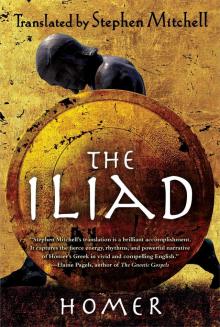 The Iliad
The Iliad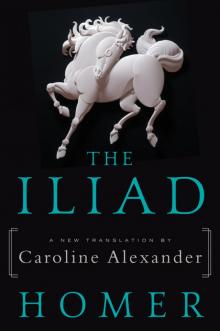 The Iliad (Trans. Caroline Alexander)
The Iliad (Trans. Caroline Alexander)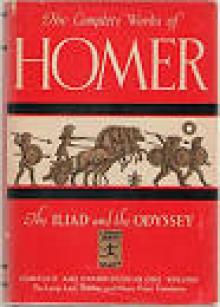 Complete Works of Homer
Complete Works of Homer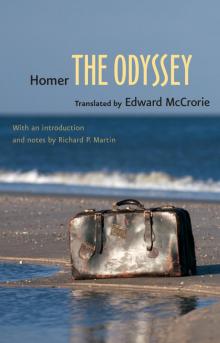 The <I>Odyssey</I>
The <I>Odyssey</I>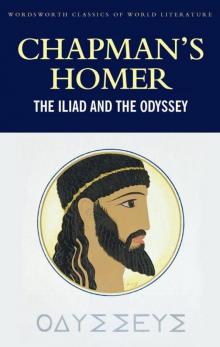 The Iliad and the Odyssey (Classics of World Literature)
The Iliad and the Odyssey (Classics of World Literature)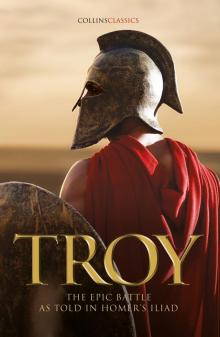 Troy
Troy The Iliad (Penguin Classics)
The Iliad (Penguin Classics)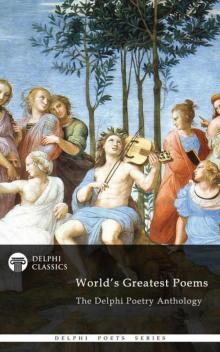 Delphi Poetry Anthology: The World's Greatest Poems (Delphi Poets Series Book 50)
Delphi Poetry Anthology: The World's Greatest Poems (Delphi Poets Series Book 50)